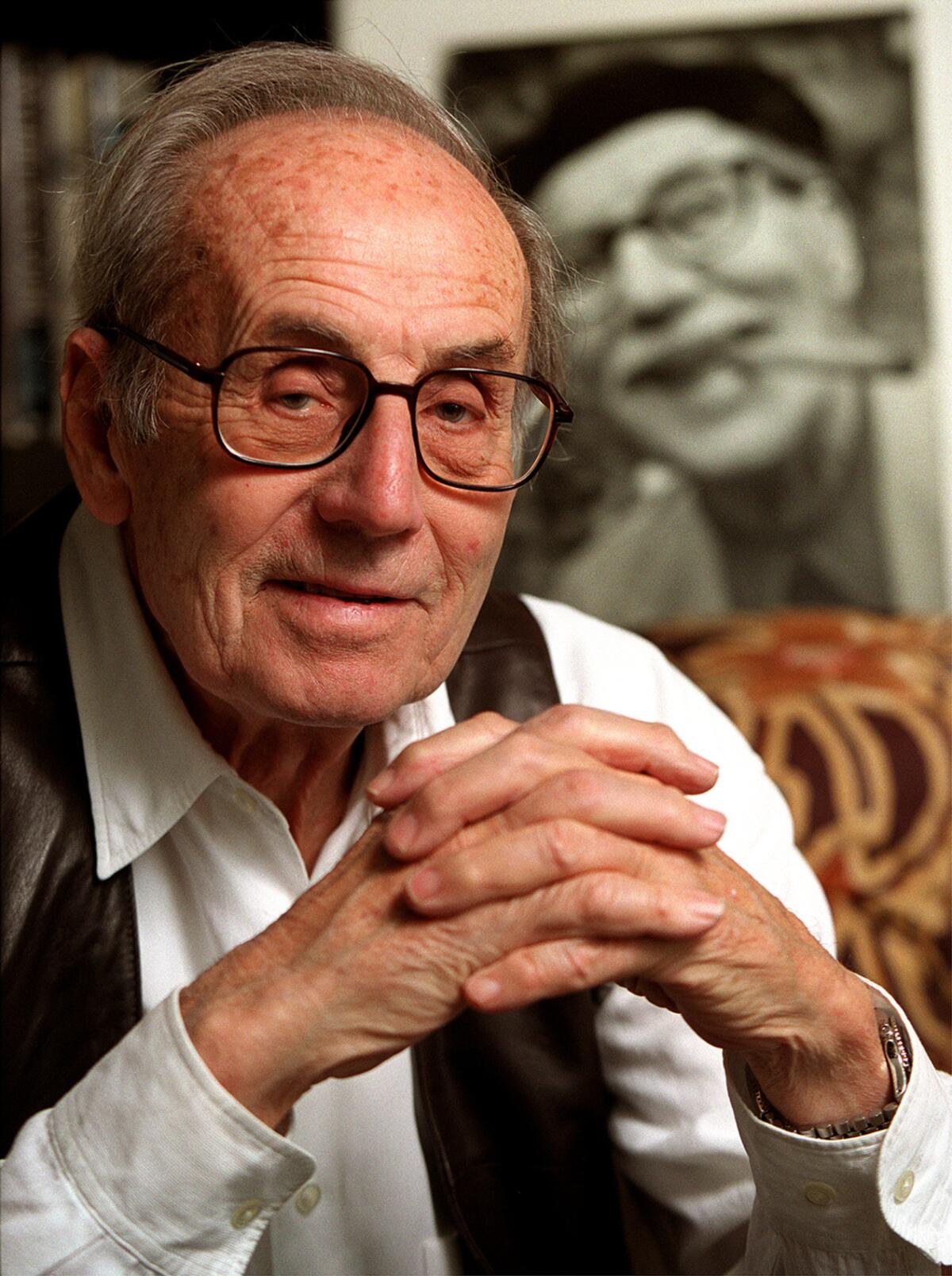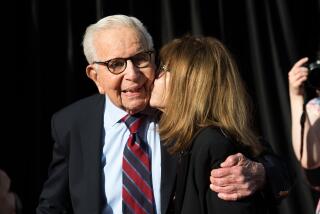Arthur Marx dies at 89; writer son of Groucho

- Share via
Arthur Marx, a veteran television writer, playwright, celebrity biographer and memoirist who wrote extensively about an often fractious life with his father, comedic legend Groucho Marx, has died. He was 89 and died of natural causes Thursday at his Los Angeles home, said his son, Andy.
Marx was the only son of Groucho, who, with his exaggerated eyebrows, mustache and mastery of the lightning-quick, ad-libbed putdown, was the most prominent member of the Marx Brothers.
“His father was never far from him,” said actor Frank Ferrante, who portrayed the iconic comedian in the 1986-87 off-Broadway production of “Groucho: A Life in Revue,” written by Marx and Robert Fisher. “Groucho had a long shadow. But Arthur had a career on his own, which was quite impressive.”
Following his father’s advice, Marx became a writer instead of an actor, producing a novel and several screenplays before concentrating on scripts for such popular television shows as “McHale’s Navy” and “My Three Sons” and writing biographies of such classic Hollywood figures as Samuel Goldwyn, Red Skelton, Bob Hope and Mickey Rooney.
Although he carved out his own career, “his favorite topic always seemed to remain his dad,” said author Robert S. Bader, a Marx Brothers historian.
In addition to the off-Broadway play, which Marx also directed, he wrote the books “Life With Groucho” (1954); “Son of Groucho (1972), the cover of which has an illustration showing Marx emerging from Groucho’s head; and an updated, combined version of the first two volumes called “My Life With Groucho” (1992). He also mentions his father in “Not as a Crocodile” (1958), a collection of stories about his family, and displayed candid photos of him in “Arthur Marx’s Groucho: A Photographic Journey” (2003).
His father and uncles inspired a 1970 Broadway play, “Minnie’s Boys,” also co-written with Fisher.
Marx’s books portrayed his father as a man who was stingy with his emotions and who once threatened to sue him. In his father’s declining years, Marx became a central figure behind a successful legal battle to wrest back control of Groucho’s affairs from his late-in-life companion, Erin Fleming.
Born in New York City on July 21, 1921, Marx was the second of three children of Groucho and his first wife, Ruth Johnson. As a child he often went on the road with his father and uncles Harpo, Chico and Zeppo when they were playing vaudeville. He moved with his family to Los Angeles in the early 1930s.
Marx attended USC for a year before joining the Coast Guard in 1942 and serving in the Philippines during World War II. After the war, he went to work at MGM as a reader. His earliest screenwriting credits include several films in the “Blondie” series, including “Blondie in the Dough” (1947).
He made his debut as a novelist in 1950 with “The Ordeal of Willie Brown,” drawn from his experiences as a top-ranked junior tennis player in the 1930s and early 1940s. Groucho “recommended that I tear it up,” Marx recalled in a 1986 interview with The Times.
His father hated his next book, “Life With Groucho,” even more. Father and son stopped talking and communicated through lawyers.
When the book was accepted for serialization by the Saturday Evening Post, Marx gave his father a set of galleys. Groucho filled it with corrections and handed it back to his son. “I said, ‘Thanks, I’ll take care of this’ and on the way out of the house, I dropped them in the trashcan,” Marx recalled in a 2003 interview. He said his father never knew the difference and ended up promoting the book on his popular TV quiz show, “You Bet Your Life.”
None of the biographies he wrote were authorized, Marx said, because “celebrities never tell the truth, at least not the whole truth.” He wanted the freedom to show some of their warts, as in “The Secret Life of Bob Hope” (1993), in which he alleged that the popular, long-married entertainer had “made love to more beautiful women than Errol Flynn, my Uncle Chico and Bing Crosby combined.”
Marx co-wrote with Fisher several Hope movies, including “Eight on the Lam” and “I’ll Take Sweden.” With Fisher he also wrote the 1965 hit Broadway stage comedy “The Impossible Years,” which starred Alan King and was adapted for a 1968 film that starred David Niven.
He began writing for television in 1960 with an episode of “General Electric Theater.” He worked steadily in the medium for the next three decades, writing for such top-rated sitcoms as “Petticoat Junction,” “Love, American Style” and “Alice.”
He said he regretted not being close to his father at the end of Groucho’s life, but he believed he had gained the old man’s respect.
“My father went to Broadway to see my play ‘The Impossible Years,’ ” he told the Associated Press a dozen years after Groucho’s death in 1977. “I had of course told the ticket girl to give him free tickets. The girl started to give him a hard time and he said, ‘Don’t you know who I am? I’m Arthur Marx’s father!’ ”
His first marriage ended in divorce. In addition to his son Andy, Marx is survived by his second wife, Lois; son Steve; a stepdaughter, Linda; two sisters, Miriam and Melinda; and four grandchildren.
Services will be private.
More to Read
Start your day right
Sign up for Essential California for the L.A. Times biggest news, features and recommendations in your inbox six days a week.
You may occasionally receive promotional content from the Los Angeles Times.





